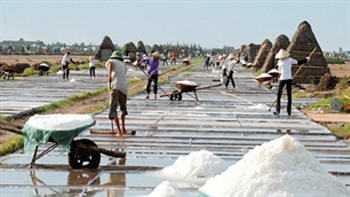Imports of salt and sugar do not affect domestic production.
Deputy Minister of Industry and Trade Nguyen Thanh Bien affirmed that the time for imports is ripe and will not affect domestic production.
According to Circular No. 22/2012/TT-BCT, the Ministry of Industry and Trade allocates import tariff quotas of 100,000 tons of industrial salt to traders directly using it as raw materials for chemical production and 2,000 tons of pure salt to traders directly using it as raw materials for the production of medicines and medical products.

Also according to this Circular, the Ministry of Industry and Trade allocates import tariff quotas of 50,000 tons of refined sugar and raw sugar to traders directly using sugar as raw materials for production and 20,000 tons of raw sugar to sugar producers for refining to supply production and consumption.
| Salt, sugar, and poultry eggs imported under this year's tariff quota will be implemented according to the Circular of the Ministry of Industry and Trade from August 6 to December 31. |
This circular has caused public concern because the domestic salt and sugar production industry is facing many difficulties. However, Deputy Minister of Industry and Trade Nguyen Thanh Bien affirmed that the time for imports is ripe and will not affect domestic production.
In addition, according to Ms. Phan Thi Dieu Ha, Deputy Director of the Import-Export Department of the Ministry of Industry and Trade, four items, salt, sugar, cigarettes and chicken eggs, must all be granted import tariff quotas according to Vietnam's commitments when joining the WTO.
According to the agreement between the Ministry of Industry and Trade and the Ministry of Agriculture and Rural Development for salt, the first phase of quota allocation will be 53,000 tons, of which 51,000 tons of industrial salt will be for traders to use as raw materials for chemical production and 2,000 tons will be for traders to use as raw materials for drug production.
However, because we have to wait for all the salt in the country to be consumed, the delivery of 51,000 tons will only be made in September 2012, the remaining quota will be allocated based on market demand.
Regarding sugar products, according to Mr. Doan Xuan Hoa, Deputy Director of the Department of Agriculture, Forestry and Salt, Ministry of Agriculture and Rural Development, in the context of limited domestic purchasing power, quota allocation is appropriate.
According to Mr. Hoa, during the integration process, the sugar industry has made many efforts to improve, however, compared to the world, the level of competition is still low, and the efficiency of sugar production is still not high. Therefore, the classification according to import quotas is actually also to protect the domestic market.
“Salt, which is directly related to salt farmers, and sugar are still very young products in the face of world competition, so the quota is mainly to protect domestic production. The allocation of this quota must also comply with the intended use and businesses must report monthly to the inter-ministerial committee, and the inter-ministerial committee will also monitor this import. As for traders who are assigned but do not comply, they will be transferred to other businesses,” said Ms. Phan Thi Dieu Ha.
According to the tax reduction roadmap when joining the WTO, import tax will also gradually decrease from now until 2018. Meanwhile, according to the joint assessment of the ministries, the difference between retail and factory prices for these items is still too high.
Mr. Doan Xuan Hoa said that no country bases the retail price of sugar on the price of sugar produced, in fact, there is a certain difference between countries. However, Vietnam's sugar product is still quite young compared to the world, so protection requires the sugar industry to be more competitive.
Deputy Minister Nguyen Thanh Bien requested that businesses need to have direction, improve quality and reduce costs to be competitive with similar products in the world.
The Ministry of Industry and Trade has directed businesses that need to use industrial salt for chemical production to develop a plan to prioritize the use of high-quality salt produced domestically./.
According to (VOV) - LT






